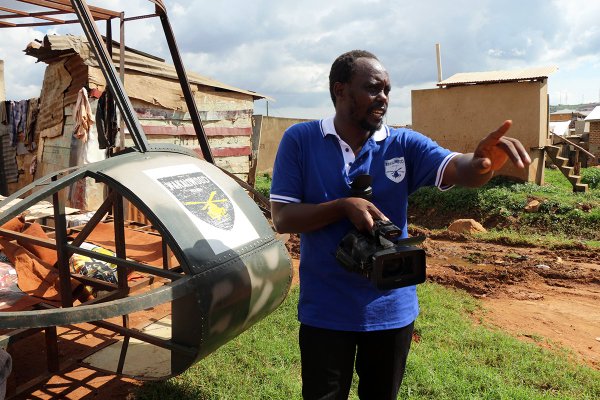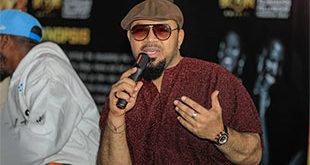
Getting to Isaac Geoffrey Nabwana’s home in the low-end Kampala neighborhood of Wakaliga is tough and it does not prepare you for what you will find there. Along the narrow paths, you find mostly shirtless men with their bare chests out, and others are in trousers bigger than their size, whereas others keep long, in some cases, plaited hair.
Nabwama himself is no eye-candy. His hair is in the area’s favoured style; that is unkempt hair; same with his beard. With his unusually red eyes, he is quite intimidating. Yet this feeling disappears immediately he starts to talk. He is soft spoken, welcoming, and unhurried even as he attends to a seemingly endless lot of mainly young men; including foreigners that throng his place.
Nabwana, his film company Ramon Productions and Wakaliwood became a talk of town when he produced an action movie titled ‘Who killed Captain Alex’. It grabbed the attention of both Ugandans and foreigners and has been considered the country’s first action movie.
Wakaliwood is a nickname he gave to the film industry owing to the fact that he grew up in Wakaliga and Ramon comes from Racheal and Monica the two grandmothers who he has known as his only parents since he was separated from his mother when he was just a few months old.
When The Independent visited his studio, Nabwana was attending to five German film enthusiasts who had watched his movies via YouTube and were looking forward to doing a movie with him. Also present was Allan Hofmanis, a filmmaker from New York, USA, who has pitched camp at Wakaliga since 2012 after watching a trailer for the film and has now featured in a number of Nabwana’s films.
“I am working on a new movie about the Kifeesi group. Almost every foreigner who has come here recently has asked me about them. I feel this Kifeesi thing has been over hyped,” he says about a gang of criminals operating in down town Kampala.
That’s how he gets ideas for his movies – from issues that affect people in everyday life. His very first movie called ‘Ekisa Butwa’ involved a Muslim girl getting married to a Catholic boy and was mainly about what happens when conflicting families have to get together. That is something that many people face in society.
But his interest in movies is beyond what happens in society. He says he started picking interest in film as a little boy when his brothers narrated to him the movies they had watched. He never got a chance to watch a movie early because his grandmother always warned him against bringing shame to her and going to the cinema hall was one thing they frowned upon. But even when he did not go there, the stories made him feel as though he was acting in the movies themselves. “I kept telling myself that I will make movies when I finish school.”
Even though he could not complete school, had no money, and did not know a thing about cameras and computers, Nabwana never gave up.
In 2005, at 33 years, he got a chance of holding a small video camera that belonged to his neighbor. That is how he started recording small videos. He bought an old fashion desktop computer and later software to edit videos with advice from a friend. He says he realised all the problems in his neighbourhood rotated around having no money to start out. He then thought of the strategy of going about it without having to invest a lot. He had to convince his friends and family members to become volunteers. For costumes and other items needed in the movies, they had to be more innovative. For instance for the guns, they used wood and broken furniture. Though Nabwana has no definite figure of how much he spends on making a film, he says there is no single one that has cost him beyond a million shillings.
Nabwana’s liteside
Any three things we don’t know about you?
I direct and write movies but I don’t act. Through school my teachers never liked me because I was very shabby and stubborn. I also never went to cinema halls despite many of them sprouting out in my neighborhood because I feared my grandmother.
What is your idea of perfect happiness?
Perfect happiness comes when one is free to do what they want and are not scared of the repercussions of their actions.
What is your greatest fear?
Failure
 The Independent Uganda: You get the Truth we Pay the Price
The Independent Uganda: You get the Truth we Pay the Price



